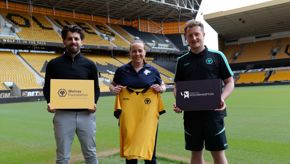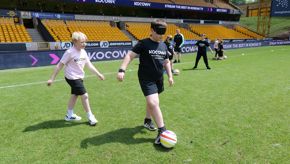Like all responsible businesses and organisations, Wolves are supportive of all those who are taking part in Ramadan, including several of the club’s players.
The finance manager for Wolves Foundation is Zulf Khan, who is observing Ramadan and has kindly provided us with more details about the teachings behind the holy months and how it affects him in daily life.
First of all Zulf, can you tell us about more about the background to Ramadan?
Ramadan is the ninth month of the Islamic calendar and one of the five pillars of Islamic faith. The five pillars of Islam are as follows:
- Profession of Faith (the belief that there is no God except of Allah and Muhammed is the messenger).
- Salah – Attend prayer five times a day.
- Zakat – the obligatory donation of a Muslim’s surplus wealth to charity.
- Fasting throughout the month of Ramadan.
- The pilgrimage to Makkah for those who are financially and physically able to do so.
When does Ramadan take place and what are its objectives?
Ramadan is announced when there is sighting of the new moon, which this year took place on Tuesday 13th April. This means that the first fast commenced on Wednesday 14th April. Ramadan is due to finish on the evening of Wednesday 12th May and the following day is declared as the celebration of Eid al Fitr for all Muslims.
As mentioned Ramadan is the name of the fasting month for all Muslims, who abstain from food and drink from dawn until sundown and go through a process of spiritual self-purification. Ramadan teaches self-discipline, self-control and empathy for those who are less fortunate, hence encouraging actions of generosity.
Ramadan is a special month for all Muslims which brings not only an opportunity to practice Islam and refresh your faith but a time which also brings families together. Every special day of this holy month, Muslims will wake early to eat and close their fast before dawn (sunrise). Throughout the day you are required to abstain from food and any drink until sundown. At sundown, it’s tradition that families break their fast together.
How do you find the month of Ramadan?
My personal experience is that this month can be challenging at times, as we still have to work throughout our normal day and maintain our daily responsibilities around our children and work. However this is exceptionally rewarding because even though you are faced with the challenges of thirst and hunger you push yourself to keep going and achieve your daily fast.
How does the day start for you during Ramadan?
My day usually starts around 3.30am in order to eat and close my fast. We will then complete our first prayer of the day (Fajr) before sunset. My family and I then continue our daily routine of getting our children ready for school and, in turn, I get ready and leave for my day at the office.
Once at work, are there any particular challenges that you experience?
The biggest change as you might expect is abstaining from all food and drink. That means I miss my much-needed morning cup of tea in the office! I find the busier I am the quicker time passes me by. During my lunch break I am fortunate that Wolves allow me to attend my local mosque for my second prayer of the day called Dhuhr, which is at around 2pm. I usually take the opportunity to walk to my mosque as this allows me to build some physical activity into my daily routine. I find this helps me get through the rest of my day as it reduces the tiredness I feel which can be the case during the early stages of Ramadan.
How does the day continue from there?
On returning to work I continue with my day until around 5.30pm when I will once again complete my midday prayer (Asr) at my office. I usually complete my working day around 6.30pm and make my way home. As sundown in the UK is currently at around 8.33pm this is when we break our fast with a date and water followed by a traditional meal. We as a family will then complete the fourth prayer of the day (Maghrib) around 8.43pm. Following this we attend a special final prayer of the day (Isha & Tarweeeh) at the mosque which currently takes place from 9.42pm until 11pm.
Do you follow the same process every day during Ramadan?
Yes, although for some of the days I am not at work, the process is repeated throughout the rest of the month for approximately the next 30 days. One of my main challenges which I face as well as the abstaining from all drink and food is the tiredness, as your resting hours are considerably reduced during Ramadan.
Are there ways that people of non-Islamic faith support the Muslim community during Ramadan?
Yes, there are different ways that people can support the Muslim community. It is common to pass on the greeting ‘Ramadan Mubarak’ on the start of the new month of Ramadan, which this year was Tuesday 13th April. People can also make a real difference by being considerate when working with colleagues who may be fasting. To gain a better understanding of the fasting month, people can join in celebrating the month, provide positive support and, if possible, attend a meal when breaking the fast (Iftar) at a mosque.
How has the Covid pandemic and the lockdowns had an impact on people following the Muslim faith over the last 12 months?
Last year and the start of this year has been exceptionally difficult with the pandemic affecting every community in the world. As well as most external outlets and businesses, places of worship have been closed. From religious teachings it is more rewarding for a Muslim to perform its daily five prayers at a local mosque, which is something we have not been able to do. Finally we are starting to see some much needed return to normality in our lives and in line with the relaxing of restrictions, we as an Islamic community are able to attend daily prayers at our local mosques.
The vaccination programme to try and help reduce the effects of the pandemic remains in full flow. Are Muslims still able to take up the offer of a vaccination during Ramadan?
There will be many varied opinions around the COVID 19 vaccine during Ramadan, which states that we should refrain from anything entering the body between sunrise and sunset. However, as advised by the Islamic scholars, by taking up the vaccine while fasting does not invalidate our fast. The main reason is that the vaccine does not in any form provide any substance or nutrition to your body. The Holy Quran states, ‘saving one life, is to save the whole of humanity.’ It is the responsibility of every practising Muslim to take their vaccine to protect themselves and others. Therefore, in my opinion it is completely satisfactory to continue this process and I believe that, if provided the opportunity to vaccinate during daytime hours, you should proceed and play your part.
Finally Zulf, you mention the challenges of Ramadan with the abstinence and tiredness. What positives do you take from the month in terms of the opportunity for spiritual reflection and self improvement? And what does Ramadan mean to you personally?
There are many positives that you can take from the month of Ramadan. One of the key things that Ramadan teaches is self-control, to abstain from all food and drink and to be kind, respectful, honest and not argumentative. It is common human nature that we all wish for better things in life like a high profile job, nice car, house and of course a healthy bank balance. Ramadan provides you with a unique opportunity for self-reflection. It reminds you to remember the people who are less fortunate in life than you and suffer in this world because they do not have what we take for granted in our everyday lives. It makes you truly understand how fortunate we are and what it really means to be poor and not have enough for your daily needs. Ramadan provides you with the opportunity to think how we can live our lives in a more compassionate way towards others. By compassion I mean being kind and reaching out to people who may be less fortunate or simply someone in need of help or good company.
Personally for me, it’s a time of self-reflection and an opportunity to refresh my faith. It helps me build a closer relationship with my mosque and community by attending the prayers more regularly. It teaches me to reach out to someone who may need my help or support or just a listening ear. To be kind, patient and a more understanding individual going forward which are all good values of a Muslim. From a family perspective it helps bring my family together and provides a unique challenge that we all face on a daily basis. By the end of the month it enables you to redevelop your soul, to be a better person and live an improved, generous way of family life. I feel this carries me through for the rest of the year, until once again Ramadan will be upon me to start the whole process again, of self-reflections and to realise where I may have faltered over the last 12 months.












